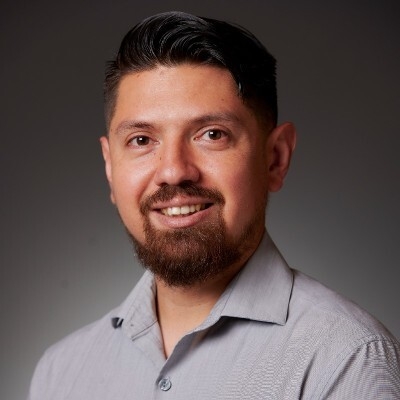With a punk rock metalhead background, ARCS Minnesota Scholar Daniel Mendez didn’t have the typical STEM background as he grew up surrounded by gang activity. He never planned on studying neuroscience. But after quitting his punk rock band before they toured and later learning about his brother’s kidney failure diagnosis, Mendez found an interest in studying stem cell research through an undergraduate research scholarship lab. It was a stepping stone to his goal of entering the regenerating whole-organs field.
“I still wasn’t convinced I wanted to go into neuroscience,” Mendez recalls. “A large part of my disinterest was my bigger passion for organ regeneration.” However, after graduation, his first entry-level role as a Research Associate at the Children’s Hospital in Orange County, California (CHOC) solidified his interest in neuroscience. There, he worked on stem cell regeneration research.
After his short stint at City of Hope, he moved with his wife to get his masters in Biological Sciences to study whole organ engineering at the University of Minnesota. “I realized this wasn’t really what I wanted to do anymore, and I was finding myself more interested in neuroscience,” says Mendez. Even his wife noticed and pointed out to him how unhappy he was since leaving neuroscience.
Through divine intervention, Mendez met a new University of Minnesota professor at a local church he visited. This professor later hired Mendez to work in his neuroscience lab to study iron deficiency on the developing brain in early childhood as part of his PhD research in Neuroscience. This was his path back to neuroscience.
The original intention was to focus on alternative treatments for iron deficiency, but Mendez and his advisor realized they needed a better understanding of iron deficiency in the mitochondria before focusing on treatments.
The saying that “the mitochondria is the powerhouse of the cell” is true, but it does more. “The inner membrane is where the protein complexes sit that pass down electrons to maintain a proton gradient to generate most of the energy for the cell. These complexes require iron to function,” he says.
Their lab uses cell and animal models to focus on how iron deficiency affects the hippocampus, a region of the brain associated with learning and memory. “We find out that iron deficiency is a risk factor for schizophrenia, ADHD, and depression when it’s acquired in early life,” he says. He explains that the first thousand days of a newborn’s life are a sensitive period as several developmental milestones occur, and they require a lot of energy.
The research hits home for Mendez, literally, as his daughter has suffered from two febrile seizures. Using his research on iron deficiency, he investigated if there was a link between iron deficiency and febrile seizures when he suspected his daughter might have been iron deficient. The answer was yes, as he discovered a recent paper his university published in collaboration with Masaryk University in the Czech Republic shows a multivariate linear mixture model that iron status can predict if someone will have febrile seizures.
“Two out of three times after she’s had a febrile seizure, I’ve had her iron levels checked, and they’ve always been low,” Mendez shares. Following the advice of his iron deficiency expert on his committee, he’s changed his daughter’s diet to include red meat because it’s a bioavailable form of iron. “She would always get better after, and now it’s stabilized,” he says.
He shares how his background lacked academically driven individuals, so it was hard for him to go into a lab, as his personal life differed vastly from his academic life. “Find people in the stages of life where you want to get to and build your network out of that,” he advises.
Mendez is grateful for being a Scholar Award recipient because if he hadn’t, he was going to join the military reserves. Between raising his family, attending school, and trying to manage his daughter’s health, it was overwhelming for him. “It came to a point where we just couldn’t do it anymore, and I didn’t see any other way,” he says. “I found out I was nominated for the award right as I was initiating contact with different branches of the armed forces to learn about and apply for different officer roles as a reservist.”
Since receiving the Scholar Award, he’s dedicated more time and energy to his research while supporting his kids. “The financial benefit from ARCS as a grad student with a family really helped, and ARCS gave me a community again,” he concludes.

